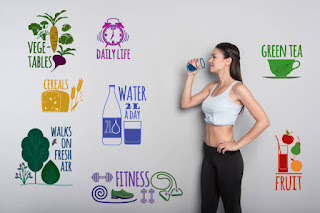Diet & Skincare
Skin care is a complicated routine involving various treatments and products. However, the impact of diet on skin health is often missed. What we consume significantly influences the condition and appearance of our skin. This blog will try to tell you all how diet affects skin care, exploring the types of foods that promote a healthy complexion and those that may harm it.
The Skin and Its Nutritional Needs
The skin is the body's largest organ, serving as a barrier against environmental aggressors and playing a vital role in overall health. To function optimally, it requires a steady supply of nutrients. Key vitamins, minerals, and antioxidants support skin health by protecting against damage, promoting repair, and maintaining moisture levels.
1:Hydration: The Foundation of Skin Health
Water is essential for maintaining skin hydration and elasticity. Dehydration can lead to dry, flaky skin and bring to fine lines and wrinkles. Drinking an enough amount of water daily helps flush out toxins, keeps the skin plump, and supports its natural barrier function. Aim for at least eight glasses of water a day, and consider increasing your intake during hot weather or after intense physical activity.
2: The Role of Antioxidants
Antioxidants are compounds that balance out free radicals, unstable molecules that can damage cells and contribute to aging and diseases, including skin conditions. A diet rich in antioxidants can help protect the skin from oxidative stress, leading to a healthier and more youthful appearance.
Foods Rich in Antioxidants:
Berries:(blueberries, strawberries, raspberries)
Dark leafy greens: (spinach, kale)
Nuts and seeds: (almonds, sunflower seeds)
Fruits:(oranges, kiwi, papaya)
Vegetables: (carrots, sweet potatoes, bell peppers)
Green tea:
3:Essential Fatty Acids for Skin Health
Omega-3 and omega-6 fatty acids are crucial for maintaining the skin's greasy barrier, which helps retain moisture and protect against irritants. These essential fatty acids also possess anti-inflammatory properties, beneficial for conditions like eczema*** and ***psoriasis.
Sources of Omega-3 and Omega-6:
Fatty fish: salmon, mackerel, sardines
Flaxseeds and chia seeds
Walnuts
Avocados
Olive oil
4:The Importance of Vitamins:
Vitamins play various roles in skin health, from collagen production to UV protection. Ensuring your diet includes a variety of vitamins can lead to a radiant complexion.
Key Vitamins for Skin Health:
Vitamin A: Supports cell production and movement , contributing to a smooth and even skin tone. Found in sweet potatoes, carrots, and leafy greens.
Vitamin C: Essential for collagen synthesis, which keeps the skin firm and strong. Abundant in citrus fruits, strawberries, and bell peppers.
Vitamin E: Acts as a powerful antioxidant and helps in skin healing. Present in nuts, seeds, and green leafy vegetables.
Vitamin D: Regulates skin cell growth and repair, important for preventing skin disorders. Obtained through moderate sun exposure and foods like fortified dairy and mushrooms.
5: Protein and Collagen Production:
Collagen, a protein that gives skin its structure and elasticity, declines with age. Consuming sufficient protein is vital for collagen production and overall skin health. Amino acids from dietary protein are the building blocks for collagen.
High-Protein Foods:
Lean meats: (chicken, turkey)
Fish and seafood
Eggs
Legumes
Dairy products
Soy products
5:Foods to Avoid for Healthy Skin:
While some foods can enhance skin health, others may have harmful effects. Processed foods, high in sugar and unhealthy fats, can lead to inflammation and breakouts. Here are some dietary wrongdoer to watch out for:
Sugary snacks and beverages: High sugar intake can cause insulin point, leading to increased sebum production and acne.
Processed foods: Often high in trans fats and additives, these can activate inflammation and skin issues.
Dairy products: Some studies suggest that dairy can worsen acne in certain individuals.
Alcohol: Dehydrates the skin and enlarges blood vessels, leading to a flushed appearance and potentially worsening conditions.
6:The Role of Gut Health(Stomach)
Coming out research suggests a strong link between gut health and skin conditions. A balanced gut microbiome can reduce inflammation and support a clear complexion. Probiotics, found in fermented foods like yogurt, kefir, and sauerkraut, can enhance gut health. Additionally, fiber-rich foods like whole grains, fruits, and vegetables support a healthy digestive system.
7:Personalized Nutrition for Optimal Skin Health
Everyone's skin responds differently to various foods, making it essential to observe how your diet affects your skin. Keeping a food diary can help identify potential triggers and beneficial foods. Consulting with a dermatologist or a nutritionist can provide personalized dietary recommendations changed to your skin's needs.
Inshort, A global approach to skin care includes not only the right topical treatments but also a balanced diet rich in nutrients essential for skin health. Hydration, antioxidants, essential fatty acids, and vitamins play significant roles in maintaining a radiant complexion. By nourishing your skin from within and avoiding harmful foods, you can achieve and maintain healthy, glowing skin. Remember, beautiful skin starts from the inside out.***Eczema is a condition that causes your skin to become dry, itchy and bumpy.
Psoriasis wis a long-lasting disease in which the immune system becomes overactive, causing skin cells to multiply too quickly. Patches of skin become scaly and inflamed, most often on the scalp, elbows, or knees, but other parts of the body can be affected as well.



